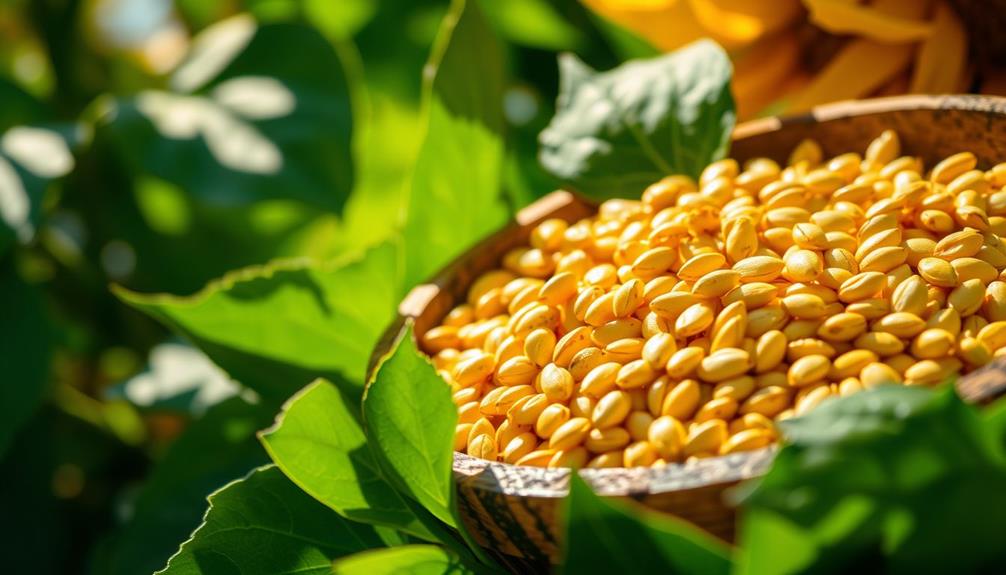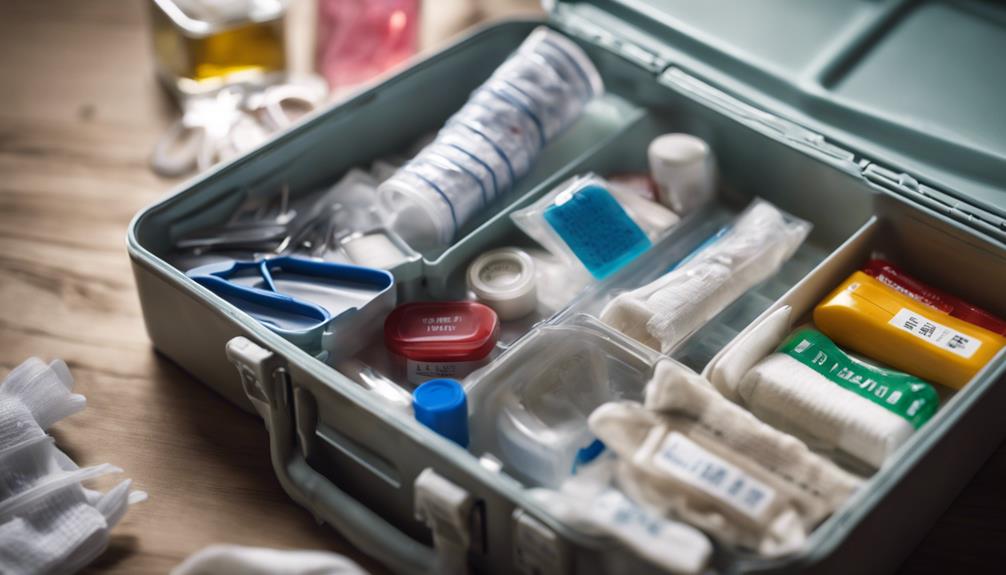Sunflower seeds pack a nutritional punch, making them a survival superfood you can't ignore. They're rich in protein, healthy fats, and essential vitamins, giving you the energy and nutrients you need. High in antioxidants, these seeds help combat oxidative stress too. Plus, growing sunflower seeds is simple; just plant them in well-drained soil with lots of sunshine. They'll thrive, and you can harvest the seeds to enjoy fresh or store for later. Not only do they benefit your health, but they also support the environment and can even boost your local economy. There's much more to discover!
Key Takeaways
- Sunflower seeds are packed with over 17 grams of protein per 100 grams, making them a great energy source for survival situations.
- They are rich in healthy fats and essential nutrients like vitamins E, B1, and magnesium, supporting overall health and vitality.
- Sunflowers are drought-resistant and easy to grow, providing a reliable food source with minimal resource requirements.
- Their antioxidant properties help combat oxidative stress, promoting long-term health during challenging circumstances.
- Cultivating sunflower seeds can reduce grocery bills and enhance self-sufficiency, contributing to local food security.
Nutritional Power of Sunflower Seeds

Sunflower seeds are a powerhouse of nutrition, making them an excellent choice for anyone looking to boost their diet. Packed with over 17 grams of protein per 100 grams, they're perfect for supporting muscle repair and growth.
You'll also benefit from their high content of healthy fats, particularly unsaturated fatty acids, which help reduce cholesterol levels and promote heart health. These seeds are rich in essential nutrients like vitamins E, B1, and B6, along with minerals such as magnesium, phosphorus, and selenium.
Additionally, their antioxidant properties combat oxidative stress, enhancing your overall health. Including sunflower seeds in your meals not only adds nutritional variety but also complements other foods, making them ideal in survival situations.
Growing Sunflower Seeds

If you're looking to incorporate the nutritional benefits of sunflower seeds into your diet, growing them yourself can be an incredibly rewarding experience.
Start by selecting a suitable variety, like Mammoth Russian or Black Oil, known for their high protein content. Plant your seeds in well-drained soil after the last frost, ensuring they get full sun exposure and regular watering.
Space the seeds about 6 inches apart to allow for proper growth. Keep an eye on them as they develop; they thrive in sunny conditions and are quite drought-resistant.
With a little care, you'll soon have a beautiful sunflower patch, providing you with fresh seeds to enjoy in your meals or snacks. Happy gardening!
Harvesting Techniques for Success

Once the flower heads of your sunflowers have turned brown, it's time to harvest for ideal seed collection. Carefully cut the heads off, leaving a few inches of stem attached. This will make handling easier.
Curing the harvested heads upside down in a dry, cool place for about two weeks helps preserve the seeds. Once dried, gently rub the flower heads to release the seeds. You can also use a screen or a sieve to separate seeds from chaff.
Be sure to store your seeds in airtight containers, keeping them cool and dark to maintain freshness. Proper handling and storage guarantee that you enjoy your sunflower seeds long after harvest, maximizing their nutritional benefits for your survival needs.
Environmental Benefits of Sunflowers

Harvesting sunflowers not only provides you with nutritious seeds but also offers significant environmental benefits.
These vibrant plants play an essential role in soil remediation, effectively cleaning contaminated soil and enhancing overall health. Their deep root systems aerate and enrich the soil, promoting better growth for surrounding plants.
Sunflowers attract important pollinators like bees and butterflies, helping to support biodiversity in your garden and local ecosystem. By incorporating sunflowers into crop rotation, you can boost biodiversity and aid in carbon sequestration, which helps reduce greenhouse gases.
Additionally, they can mitigate environmental radiation, making them valuable for long-term sustainability. By growing sunflowers, you contribute positively to your environment while reaping nutritious rewards.
Long-Term Storage Tips

Long-term storage of sunflower seeds is essential to maintain their nutritional value and guarantee they remain a reliable food source. To assure your seeds last, follow these tips:
| Storage Method | Container Type | Best Temperature |
|---|---|---|
| Airtight Containers | Glass or Plastic | 32°F to 50°F |
| Vacuum Sealing | Food Saver Bags | 32°F to 50°F |
| Freezing | Freezer Bags | Below 0°F |
| Drying | Dehydrator | Room Temperature |
Store your seeds in a cool, dark place away from moisture and light. Regularly check for any signs of spoilage, and remember that properly stored seeds can last for months, providing you with a nutritious option when needed. If you are preparing for emergency situations, it’s important to store a variety of seeds in your survival bag. This will ensure you have access to a sustainable food source in case of limited resources. Prepare your survival bag with a range of seeds such as quinoa, chia, and flaxseeds to provide a well-rounded and nutritious diet during times of need.
Community Support and Networking

Building a strong network within your community can greatly enhance your preparedness efforts. Engaging with like-minded individuals allows you to share knowledge on sunflower seed cultivation, storage techniques, and nutritional benefits.
Attend local workshops or forums to connect with experienced preppers who can offer valuable insights and practical skills. By exchanging tips and resources, you'll strengthen your support system and create a sense of camaraderie.
Consider joining online groups focused on gardening and survival strategies, where you can learn and contribute.
Don't underestimate the power of community; it can open doors to new opportunities, increase your confidence, and provide essential assistance during challenging times.
Together, you can build a self-sustaining network that thrives on collaboration and shared goals.
Economic Value of Sunflower Seeds

Sunflower seeds hold significant economic value for both individuals and communities, especially in the context of sustainable living and food security. By growing these seeds, you can reduce your grocery bills and create a source of nutritious food.
There's also a growing market for organic and locally sourced seeds, allowing you to sell surplus for profit. This not only boosts your income but strengthens local economies as well.
Additionally, participating in community workshops and prepping networks can enhance your skills, making you more self-sufficient. As demand for sunflower seeds continues to rise, investing in their cultivation can lead to a sustainable and profitable venture, ensuring you and your community thrive.
Frequently Asked Questions
Can Sunflower Seeds Be Eaten Raw or Should They Be Roasted?
You can eat sunflower seeds raw for their natural flavor and nutrients, but roasting enhances taste and crunchiness. It's your choice—enjoy them as a healthy snack however you prefer.
How Do Sunflower Seeds Compare Nutritionally to Other Seeds?
How do sunflower seeds stack up against other seeds? They boast high protein, healthy fats, and essential nutrients, often surpassing others like pumpkin or chia seeds, making them a nutritious choice for your diet.
Are Sunflower Seeds Safe for People With Nut Allergies?
Sunflower seeds are generally safe for people with nut allergies, as they aren't classified as nuts. However, always check for cross-contamination and consult a healthcare professional if you're unsure about your specific allergies.
What Are the Best Ways to Incorporate Sunflower Seeds Into Meals?
Imagine a culinary adventure—sprinkle sunflower seeds on salads, blend them into smoothies, or toss them in stir-fries. You'll boost flavors and nutrients effortlessly, transforming everyday meals into vibrant, healthy experiences that nourish your body.
Can Sunflower Seed Oil Be Used for Cooking, and Is It Healthy?
Yes, you can use sunflower seed oil for cooking, and it's healthy! It contains beneficial fats, supports heart health, and has a high smoke point, making it great for sautéing, frying, and baking.
Conclusion
Incorporating sunflower seeds into your diet and survival plan can be a game-changer. With their impressive nutritional profile and easy cultivation, you'll feel like you've discovered a treasure trove of health benefits right in your backyard. Plus, by growing these seeds, you're not just nourishing yourself; you're also supporting the environment. Don't miss out on the chance to harness the incredible power of sunflower seeds—start your journey toward self-sufficiency and wellness today!










